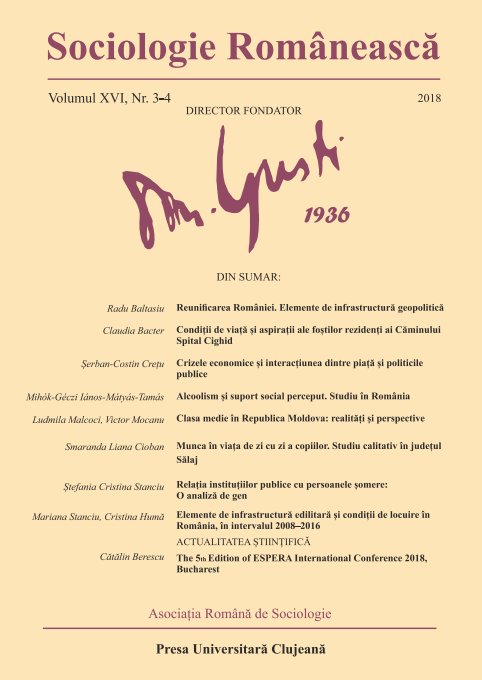Condiții de viață și aspirații ale foștilor rezidenți ai Căminului Spital Cighid
Living Conditions and Aspirations of Former Residents of Cighid Hostel Hospital
Author(s): Claudia BacterSubject(s): Social Sciences, Social development
Published by: Institutul de cercetare a Calității Vieții (ICCV)
Keywords: integration into community; institutionalization; intellectual disability; normaliza-tion; school; work;
Summary/Abstract: Child institutionalization has been and continues to be an issue at the level of our country and not only. Children’s placement in institutions affects their development in all as-pects. After reaching adulthood, many of those children who have gone through such an expe-rience face difficulties in having an autonomous life, in integrating into community and into the labour market. The purpose of this paper was to capture some relevant aspects of the lives of some young people who had been institutionalized in the Cighid Hostel Hospital for Minors with Severe Disabilities, Bihor County. The study focused on highlighting the implications of institutionalization on the young people and the factors which determined their integration, even though they were labelled as ‘hopeless’. In the study 9 young people with mild and moderate mental deficiencies were included, who were institutionalized in the communist period at the Cighid Hostel Hospital and who, at present, benefit from the services of the Romanian and Alsterdorf German Association of from Oradea. The focus group method was used. The dis-cussions focused on collecting information on the following areas of interest: aspects of the young people’s lives in the communist period/aspects of their lives in the period after 1989, how do these young people perceive institutionalization, school, their work, the support net-work, friendships, these young people’s life itinerary, wrong/inappropriate attitudes towards people with disabilities (prejudices, discriminatory actions), how they perceive their future. Our study results sustain that institutionalization determines young people’s development, with re-percussions throughout their lives. Nevertheless, the study outlines a positive image of young people, who demonstrate responsibility and wish to contribute, as much as they can, to the continuous improvement of their lives and of those from their entourage. All these aspects are possible only with a constant support from the community services and from the specialists assisting these young people.
Journal: Sociologie Românească
- Issue Year: 16/2018
- Issue No: 03+04
- Page Range: 23-37
- Page Count: 15
- Language: Romanian

